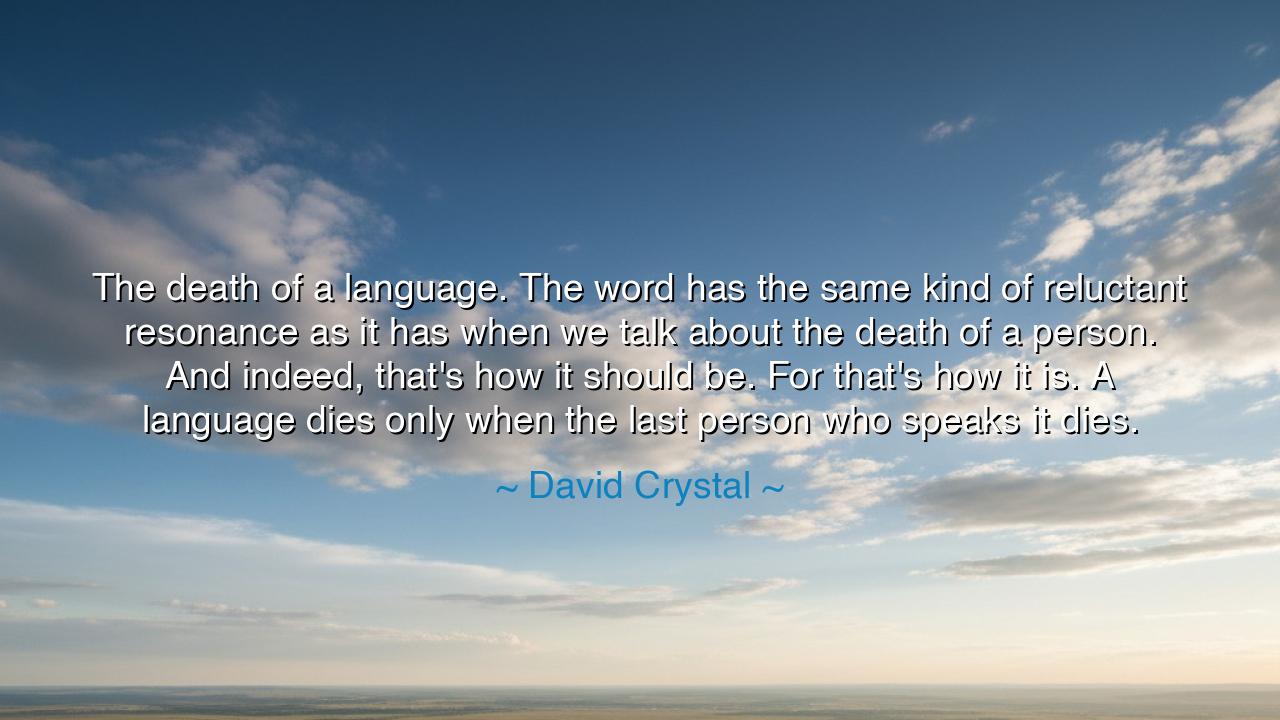
The death of a language. The word has the same kind of reluctant
The death of a language. The word has the same kind of reluctant resonance as it has when we talk about the death of a person. And indeed, that's how it should be. For that's how it is. A language dies only when the last person who speaks it dies.






“The death of a language. The word has the same kind of reluctant resonance as it has when we talk about the death of a person. And indeed, that's how it should be. For that's how it is. A language dies only when the last person who speaks it dies.”
Thus spoke David Crystal, the scholar of words, the chronicler of speech and silence, whose life has been devoted to the understanding of language as the living breath of humanity. In this profound reflection, he compares the death of a language to the death of a person, reminding us that languages are not mere tools of communication—they are living beings, the vessels of memory, identity, and soul. When a language dies, it is not just words that vanish; an entire way of seeing the world disappears into silence.
The origin of this quote lies in Crystal’s lifelong study of linguistic diversity and the global crisis of language extinction. He observed that every two weeks, somewhere on earth, a language ceases to be spoken. Each of these languages, whether known to millions or whispered by only a few, carries with it ancient wisdom, traditions, and stories that have no other home. When the last speaker passes away, that knowledge perishes too, leaving behind an echo—a memory of meaning that can never again be truly lived. Thus, Crystal’s words are both lament and warning: that the death of a language is not a metaphor, but a real and irreversible loss of human life’s richness.
In likening the fall of a language to the death of a person, Crystal invokes a sense of mourning and reverence. For language is not cold machinery—it is born of laughter, tears, and song. It carries the prayers of ancestors and the lullabies of mothers. When the last speaker of a dying tongue draws their final breath, it is as though an entire people are buried with them. The air grows thinner, the world smaller, for a voice of creation has gone silent. So too, as Crystal reminds us, should our grief be reluctant—not hopeless, but aware of what we stand to lose if we do not act to preserve what remains.
History offers us many such deaths. Consider the language of the Yaghan people of Tierra del Fuego, the southernmost reaches of the earth. Once, it flourished among the firelit shores of Patagonia, rich with words for wind, sea, and spirit. But when Cristina Calderón, its last fluent speaker, passed away in 2022, the Yaghan tongue died with her. With her passing, centuries of memory vanished into the void. No word now lives for the way her ancestors described the whisper of ice or the song of seals at dawn. Such was not just the death of a language, but the death of a world-view, a way of being that will never return.
Yet, in these words, Crystal also plants a seed of hope. For just as a language dies when its last speaker dies, so too it may live when even one voice chooses to speak it again. Revivals of endangered tongues—from the resurgence of Hebrew to the rebirth of Māori and Welsh—prove that language, like the phoenix, can rise from ashes if love and will are strong enough. Every word learned, every song sung, every story retold in a fading tongue becomes an act of resurrection—a defiance against oblivion.
The scholar’s message, then, is not only a lament but a call to guardianship. Each of us bears a responsibility to the words of our ancestors, to the songs and stories that shaped our people. To speak one’s mother tongue, to teach it, to honor it, is to keep alive the fire that burns through generations. Even those who speak global tongues must remember that diversity in language is diversity in thought—that every word lost narrows the human imagination. To preserve language is to preserve the soul of humanity itself.
So, O listener, take this wisdom to heart: cherish your language, and honor those of others. Speak it with pride. Write it, teach it, sing it. For every word you utter is a thread in the great tapestry of human life, binding the past to the present and the present to the future. When a language dies, the universe of meaning it carried vanishes into the void—but when it lives, it becomes a bridge across time. As David Crystal teaches, the death of a language is a death of humanity; but its survival, through our care and reverence, is proof that the spirit of mankind endures.






AAdministratorAdministrator
Welcome, honored guests. Please leave a comment, we will respond soon